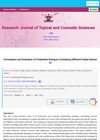 September 2023 in “Forum Dermatologicum”
September 2023 in “Forum Dermatologicum” Various treatments for common hair loss in men and women are effective, but should be tailored to individual needs and potential side effects.
 August 2023 in “Dermatology and Therapy”
August 2023 in “Dermatology and Therapy” Experts recommend personalized treatment plans for best outcomes in managing Alopecia Areata.
 May 2023 in “Journal of Clinical Medicine”
May 2023 in “Journal of Clinical Medicine” New understanding and treatments for hair loss are improving, but more research is needed.
 September 2022 in “Polish Hyperbaric Research”
September 2022 in “Polish Hyperbaric Research” Some treatments for hair loss, like finasteride, biotin, and minoxidil, can be effective, but their success varies by individual case.

Seborrheic dermatitis and dandruff are often treated with antifungal and anti-inflammatory medications, which can reduce symptoms and yeast growth on the scalp.
January 2022 in “Clinical Cases in Dermatology” A 22-year-old man has alopecia areata, an autoimmune hair loss condition, with various treatments available.
Many hair loss myths lack strong evidence, but some treatments are proven to work.
February 2010 in “Emergency Medicine News” The woman has Discoid Lupus Erythematosus and needs specialist care.
January 2023 in “International Journal of Trichology” The hemp extract significantly increased hair regrowth in both men and women without any side effects.
 11 citations,
January 2023 in “BioMed Research International”
11 citations,
January 2023 in “BioMed Research International” Microbial biosurfactants could be a safer and environmentally friendly alternative to chemical surfactants in cosmetics.
 December 2024 in “Journal of General-Procedural Dermatology & Venereology Indonesia”
December 2024 in “Journal of General-Procedural Dermatology & Venereology Indonesia” The serum effectively reduces hair loss and improves hair growth without side effects.
March 2023 in “Aktualʹnì pitannâ farmacevtičnoï ì medičnoï nauki ta praktiki” Both new minoxidil formulations significantly stimulated hair growth and improved dermal metabolism.
 1 citations,
May 2014 in “Hair transplant forum international”
1 citations,
May 2014 in “Hair transplant forum international” Rogaine can stop hair loss in women, and other treatments like certain pills, light therapy, and special shampoos may also work.
 May 2023 in “International Journal of Trichology”
May 2023 in “International Journal of Trichology” A witch-hazel-based 5% minoxidil solution is effective and safe for women with hair loss who didn't respond to regular minoxidil, especially if they're sensitive to propylene glycol.
17 citations,
August 2015 in “The international journal of lower extremity wounds/International journal of lower extremity wounds” Effective wound healing after HS treatments can be achieved with various methods like moist dressings and skin grafting.
 1 citations,
November 2023 in “Journal of cosmetic dermatology”
1 citations,
November 2023 in “Journal of cosmetic dermatology” The new anti-dandruff shampoo with ketoconazole-coated zinc oxide nanoparticles is more effective against dandruff.
 September 2022 in “JAAD Case Reports”
September 2022 in “JAAD Case Reports” COVID-19 may worsen hair loss in people with a certain type of scarring alopecia, but early treatment can help improve symptoms and hair regrowth.

Hair loss can be caused by hormones, illness, autoimmune disorders, or vitamin deficiencies, and treatments vary depending on the type.
 March 2016 in “Aktualʹnì pitannâ farmacevtičnoï ì medičnoï nauki ta praktiki”
March 2016 in “Aktualʹnì pitannâ farmacevtičnoï ì medičnoï nauki ta praktiki” The shampoo with minoxidil maintains its consistency well and spreads evenly on the scalp.
 5 citations,
February 2022 in “Acta Biomaterialia”
5 citations,
February 2022 in “Acta Biomaterialia” Nanomaterials can improve hair care products and treatments, including hair loss and alopecia, by enhancing stability and safety, and allowing controlled release of compounds, but their safety in cosmetics needs more understanding.
2 citations,
February 2024 in “Pharmaceutics” Chitosan scaffolds with silver nanoparticles effectively treat infected wounds and promote faster healing.
1 citations,
October 2021 in “International journal of pharmaceutics and drug analysis” The Aloe Vera shampoo worked better for hair care than a regular shampoo.
 April 2022 in “Medicina estética”
April 2022 in “Medicina estética” Minoxidil is the only FDA-approved treatment for female hair loss, with other potential treatments needing more research for effectiveness.
 January 2022 in “Clinical Cases in Dermatology”
January 2022 in “Clinical Cases in Dermatology” A condition called Central Centrifugal Cicatricial Alopecia causes hair loss and scalp burning in middle-aged African women, and it's treated with various medications, hair transplants, and non-drug methods like wigs.
 August 2024 in “Journal of Cosmetic Dermatology”
August 2024 in “Journal of Cosmetic Dermatology” Injectable treatments can effectively and safely improve hair growth in adults with androgenetic alopecia.
 1 citations,
December 2022 in “Research journal of topical and cosmetic sciences”
1 citations,
December 2022 in “Research journal of topical and cosmetic sciences” The herbal shampoo cleans well, promotes hair growth, and improves hair quality.
 5 citations,
August 2003 in “British Journal of Dermatology”
5 citations,
August 2003 in “British Journal of Dermatology” Iron deficiency might contribute to hair loss in women.
 27 citations,
September 2018 in “Medicines”
27 citations,
September 2018 in “Medicines” Oleic acid nanovesicles improve minoxidil absorption in hair follicles for alopecia treatment.

Oral minoxidil effectively treats hair loss, with women needing lower doses (0.25 to 2.5 mg daily) and men needing higher doses (1.25 to 5 mg daily).
 2 citations,
April 2021 in “International Journal of Pharmaceutics”
2 citations,
April 2021 in “International Journal of Pharmaceutics” Serum formulations were better at delivering molecules to the hair bulb than nanoparticles.






















